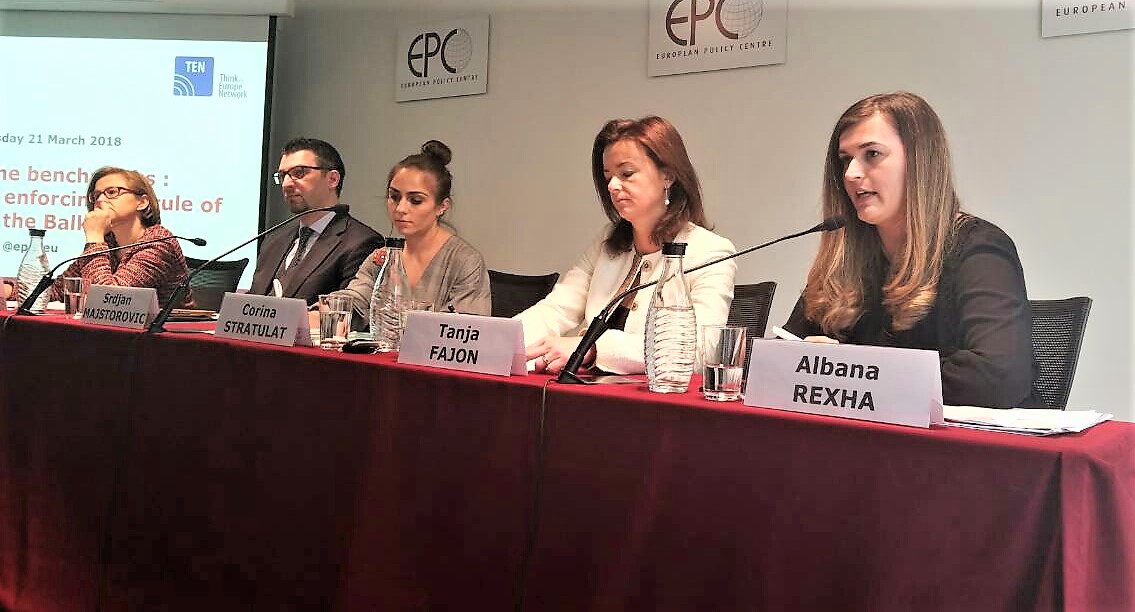TEN advocates for promoting and enforcing rule of law in the Balkans
March 21, 2018 – Today in Brussels, the Think of Europe Network and the European Policy Centre (EPC Brussels) co-hosted a policy dialogue event titled Marking the benchmark: Promoting and enforcing rule of law in the Balkans. Distinguished speakers were Sabine Zwaenepoel, Chapter co-ordinator at the Directorate-General for Neighbourhood and Enlargement Negotiations (DG NEAR), Tanja Fajon, Member of European Parliament, Srđan Majstorović, Chairman of European Policy Centre (CEP Belgrade) Governing Board, Corina Stratulat, Senior Policy Analyst at the EPC and Albana Rexha, Research Fellow at the Group for Legal and Political Studies (GLPS Kosovo).
Drawing on the results of the BENCHER regional comparative study, discussion focused on the EU’s role in helping the Western Balkan countries to achieve progress in rule of law reforms, particularly through the required track record of democratic conditionality in practice.
Ms Albana Rexha presented the findings of the regional BENCHER research project, implemented by Think for Europe Network. The research focused on the effectiveness of the EU’s benchmarking mechanism for the Western Balkans within the negotiating Chapters 23 and 24. The BENCHER sought to explain mixed results in the EU’s attempt to induce compliance, exploring whether the Union is more successful in some sub-policy areas than in others, and why, and aiming to contribute to strengthening the benchmarking as an impetus for EU-related reforms in the WB countries. Despite the EU’s firm insistence on democratic reforms, findings showed that all countries had been backsliding.
Mr Srđan Majstorović stated that the European Commission had made an extremely difficult and important step forward when it comes to communicating a credible enlargement policy. Talking about the importance of involving citizens in the EU enlargement process, he added that “there should be a fourth pillar in the enlargement policy – and that is the inclusion of citizens and civil society”.
Ms Tanja Fajon warned that „visa liberalization was a tangible result for Western Balkans citizens, but the change in rule of law is not.“ She also pointed out that EU benchmarking mechanisms are too technical and too distant to the citizens. „People in the Western Balkans want change, but this issue should be communicated in a different manner“, Ms Fajon concluded.
Since its 2011 enlargement strategy, the European Commission has adopted a more rigorous approach to democratic conditionality, building mostly on lessons learned from its eastward expansion. The EU’s increased focus on ‘good governance’ criteria (such as the rule of law, independent judiciary, media freedom and efficient public administration) was formally reflected for the first time in the negotiation frameworks for Montenegro and Serbia, which require that Chapter 23 (on the Judiciary and Fundamental Rights) and Chapter 24 (on Justice, Freedom and Security) are opened in the early stages of the talks and closed only at the very end of the process, and that overall progress is conditioned by progress in these fields.
Ms Sabine Zwaenepoel reminded the audience that the Commission had been investing continuous efforts in communicating to the candidates what the rule of law concept should entail. In her view, „Chapters 23 and 24 offer tools to make sure rule of law in Western Balkans is respected” and there is no doubt what is meant by that.
The BENCHER project was conducted with the kind support of European Fund for the Balkans (EFB) and the Open Society Initiative for Europe (OSIFE). The project was implemented by Think for Europe Network (TEN) members and coordinated by European Policy Initiative – EPI from Skopje, Macedonia.
Studies conducted within the BENCHER project can be found here.
*Take a look at the Brussels Times’ text: EU benchmarks for Western Balkans: Political will missing*

